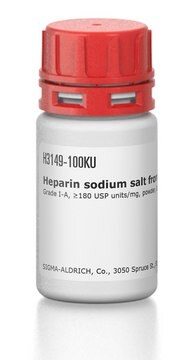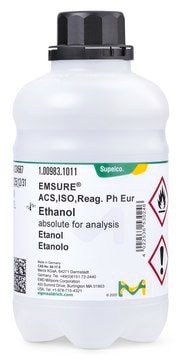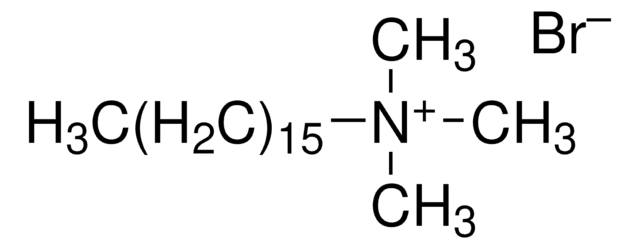I9392
3-Methylbutanol
for molecular biology, BioReagent, ≥98.5%
Synonym(s):
3-Methyl-1-butanol, Isoamyl alcohol, Isopentyl alcohol
About This Item
Recommended Products
grade
for molecular biology
Quality Level
product line
BioReagent
Assay
≥98.5%
form
liquid
technique(s)
RNA extraction: suitable
pH
5.6 (20 °C, 25 g/L)
density
0.809 g/mL at 20 °C (lit.)
suitability
suitable for nucleic acid purification
storage temp.
room temp
SMILES string
CC(C)CCO
InChI
1S/C5H12O/c1-5(2)3-4-6/h5-6H,3-4H2,1-2H3
InChI key
PHTQWCKDNZKARW-UHFFFAOYSA-N
Looking for similar products? Visit Product Comparison Guide
General description
Application
related product
Signal Word
Danger
Hazard Statements
Precautionary Statements
Hazard Classifications
Acute Tox. 4 Inhalation - Eye Dam. 1 - Flam. Liq. 3 - Skin Irrit. 2 - STOT SE 3
Target Organs
Respiratory system
Storage Class Code
3 - Flammable liquids
WGK
WGK 1
Flash Point(F)
110.3 °F - closed cup
Flash Point(C)
43.5 °C - closed cup
Personal Protective Equipment
Choose from one of the most recent versions:
Already Own This Product?
Find documentation for the products that you have recently purchased in the Document Library.
Customers Also Viewed
Our team of scientists has experience in all areas of research including Life Science, Material Science, Chemical Synthesis, Chromatography, Analytical and many others.
Contact Technical Service












